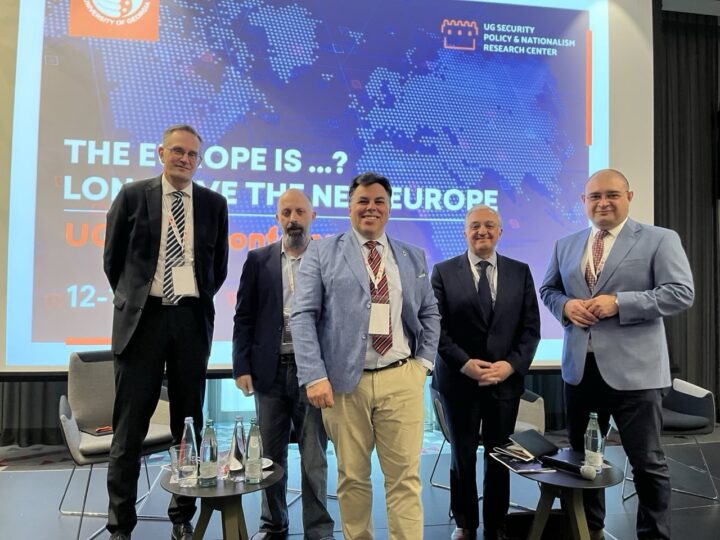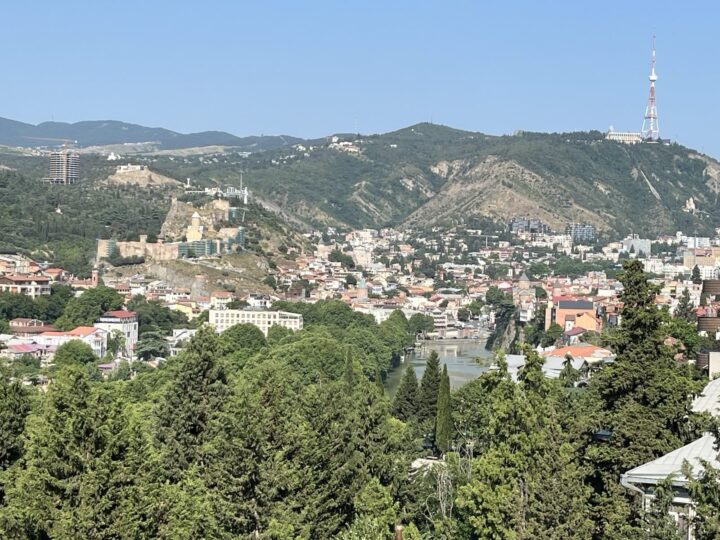23 June, 2025
Quick Impressions from Georgia: The South Caucasus in a Changing Europe
By Jakob Hedenskog
In mid-June, I travelled to Tbilisi, Georgia, to participate in the conference “The Europe is…? Long Live the New Europe!”, organised by the University of Georgia’s Policy & Nationalism Research Center (UGSPN). Now in its sixth consecutive year, the conference has rapidly established itself as an important venue for academics and practitioners from the South Caucasus, Europe, and North America.

Jakob Hedenskog, Nodar Kharshiladze, Dr. Frederic Labarre, Amb. Zohrab Mnatsakanyan, Akhmad Alili. Photo: SCEEUS
What does Europe’s push for greater security and defence autonomy mean when transatlantic relations are changing? How can the EU handle enlargement, especially in Eastern Europe, without losing its unity or core values? And in the South Caucasus, is there still room for genuine cooperation despite growing tensions? These questions framed the conference’s main panels. The same themes recurred in conversations with the Georgian experts I met.
Georgia’s authoritarian shift is accelerating at an unprecedented pace
Representatives of Georgian civil society highlighted that the new “Foreign Agents Law” – based on the US Foreign Agents Registration Act (FARA) of 1938 – came into effect on 31 May. Unlike Georgia’s earlier “Russian law”, the FARA-style legislation also targets individuals, not just organisations. Noncompliance can lead to up to five years in prison, a fine, or both. This is the latest in a series of draconian measures introduced by the ruling Georgian Dream (GD) party – 16 legislative amendments in the past year, all aimed at undermining civil liberties and the rule of law. These include a law banning opposition parties, harsher penalties for protesters, expanded police powers, bans on so-called “LGBT propaganda”, and tightened controls over media and grant-making.
Three opposition leaders are currently in pretrial detention. On 13 June, a 21-year-old protester was sentenced to 4.5 years in prison for allegedly attacking a police officer during demonstrations against electoral fraud in the 2024 parliamentary elections. Several interlocutors described Georgia’s authoritarian turn as shockingly swift. What took Russia over a decade, the GD has achieved in less than a year.

Photo: SCEEUS
The Future of European Security
The consensus at the conference was that the global situation is deeply troubling – marked by Russia’s imperialist aggression in Ukraine, divisions within the transatlantic community, and growing doubts about the reliability of American security guarantees. Putin’s aim appears clear: to reassert Russia as a Great Power, regardless of the outcome in Ukraine. A ceasefire in the war would likely embolden further Russian ambitions in the post-Soviet space – potentially targeting the Baltic states, Moldova, or the South Caucasus. Even limited Russian interventions, such as in the Baltics, could have disproportionate consequences for NATO unity. While the US still plays a key role, the EU must show that it can stand on its own. Once a ceasefire is reached, the EU should prioritise the integration of Ukraine and Moldova. Ukraine, in particular, would be a highly valuable member – with capable armed forces and extensive experience resisting Russian aggression.
